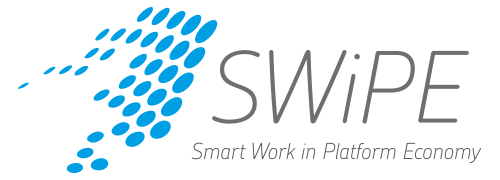The last Työn murroksen mestarikurssi (master course of the change of work) included synthesis on the basis of previous sections on how the changing work changes society and wellbeing. SWiPE Consortium leader Anne Kovalainen and researcher and program director Eveliina Saari took part in the last course. Especially, the technology’s impact on the change of work was discussed actively during the last course.
Professor Martti Mäntylä raised the societal impact of digitalization in his own introduction and predicted that many jobs will include digital elements in in the future, increasing the value and productivity of the work. He also predicted that the digitalization extends to all work and opens up new possibilities. Työelämäprofessori (Working life professor) Anne Brunila brought up to discussion the future panel’s vision of what skills are needed in the future. According to her, especially the importance of continuous learning and the people’s attributes are emphasized in future work. Brunila believes that a very large number of professions remain, but at the same time tasks and content of work, as well as working itself, change. Also, the traditional path from studying to work life will change, says Brunila. This requires a massive reform of continuous learning. Continuous learning challenges the traditional learning “tube”, traditional learning environments and knowledge identification and recognition.
Anne Kovalainen from SWiPE participated together with Ilmo Keskimäki from COPE-project and Hanna Virtanen from Polkuja työhön –project to discussion on how the work changes society and welfare. The already good abilities for future work offered by the school system was commended. – Research shows that work is a very important part of identity of the individual also in the future. However, work can mean different things to different people and work can be diversified. This requires action from society as well as from businesses, in order to create persistence for people, underlined Anne Kovalainen. According to her, the influence of the global economy is an important factor in the nation state’s decisions, as well as exploiting the platform economy.
Eveliina Saari envisioned the future working life together with Anne Brunila, Heikki Räisänen, Research Manager of the Ministry of Labour and Economic Affairs, and Liisa Heinämäki, Project Manager of TOIMI-project of the Prime Minister’s office. Eveliina Saari emphasized the importance of platform economy for the change of work. – I believe that platform economy, which is still germinating, will revolutionize the organisation of work in a positive way in the future, said Eveliina Saari. She believes that the realisation of the potential of platform work should be promoted by supporting norms already at this stage.
SWiPE research project was one of the 13 research projects of the Strategic Research Council, which were included in the Työn murroksen mestarikurssi (master course of the change of work). Overall 163 participants from 86 organization enrolled for the four sections of the course.
The recordings and discussions from the fourth course arranged on 10.4. are available at Tasaarvostn.fi. The contents are in Finnish.
